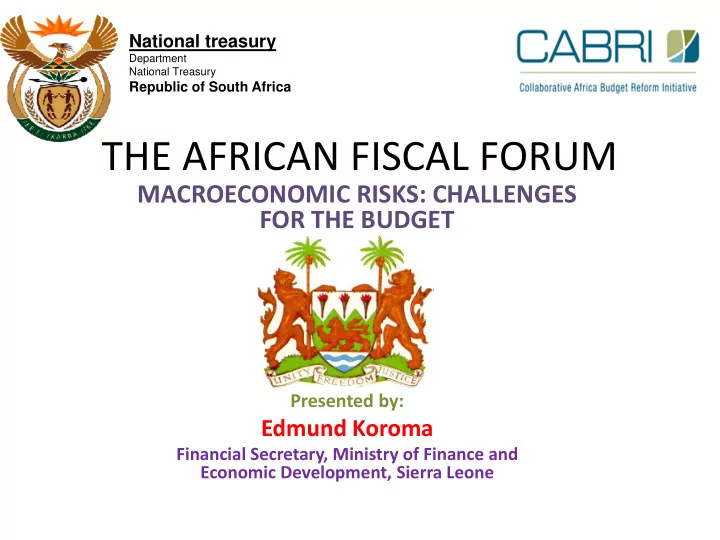

National treasury Department National Treasury Republic of South Africa THE AFRICAN FISCAL FORUM MACROECONOMIC RISKS: CHALLENGES FOR THE BUDGET Presented by: Edmund Koroma Financial Secretary, Ministry of Finance and Economic Development, Sierra Leone
PRESENTATION OUTLINE 1. Introduction 2. The impact of the Global Financial Shocks on Macroeconomic indicators 3. Sierra Leone’s response to the exogenous shocks caused by the crisis 4. Priority areas for Government’s spending to improve living conditions 5. Challenges to budget implementation 6. Conclusion-The Tasks Ahead The African Fiscal Forum
OF THE FORUM Introduction • Before the crisis Most African countries were implementing programs with the IMF, which resulted in: Stable and strong macroeconomic growth Improved balance of payments position Robust PRSP implementation Stable fiscal deficits Sustainable debt levels following HIPC & MDRI debt relief initiatives. The African Fiscal Forum
OF THE FORUM Introduction Contd. • Impact of global crisis Impact first felt by frontier and emerging countries- as they had better financial sector linkages Second round effects impacted negatively on macroeconomic performance in most African countries Reversed progress in reducing poverty and meeting the MDGs Widened fiscal deficits and implemented measures to cushion the effects of the shocks The African Fiscal Forum
Key Macroeconomic Impact on the Sierra Leone Economy INDICATOR 2006 2007 2008 2009 2010 %age Real GDP Growth 7.3 6.4 5.5 3.2 5.0 Real Per Capital GDP 3.9 3.5 2.9 0.7 2.3 Infaltion 9.5 12.0 15.0 9.2 18.0 DBR/GDP 12.2 11.3 11.5 11.8 13.3 Govt Exp/GDP 22.7 18.8 20.7 22.9 27.3 Deficits/GDP incl. Grants 2.2 1.2 4.7 3.2 6.9 Total Govt Debt/GDP 136.7 55.2 53.7 61.8 64.7 Total Investment/GDP 15.2 13.2 14.8 14.9 35.1 Gross Nat Savings/GDP 9.7 7.7 3.3 6.6 7.3 Current AC Balance /GDP 5.4 6.2 5.7 7.9 11.2 Reserves(months of Imp) 4.9 4.4 4.6 4.9 2.9 The African Fiscal Forum
Sierra Leone’s Response to the Exogenous Shocks caused by the Crisis (contd.) • Exogenous shocks – Increase in global food and fuel prices – Fall in mineral and other commodity prices – Lower and delayed donor disbursements • Response – reduced tariff and excise duty rates on fuel products and essential commodities • import duty on petroleum was reduced from 5 percent of CIF ad valorem to US$20 per metric ton; • import duty on rice was reduced from 15 to 10 percent; and eventually suspended temporarily (set at zero) The African Fiscal Forum
Sierra Leone’s Response to the Exogenous Shocks caused by the Crisis (contd) • Response contd. • the fixed reference price used to value rice was set at US$375 per metric ton, well below world prices but higher than the 2007 reference price of US$260 per metric ton; • the import duty on flour was reduced from 20 to 10 percent; • the import duty on wheat was reduced from 5 to 2.5 percent; • the import duty on sugar was reduced from 20 to 10 percent – Protect safety net programmes for vulnerable groups – countercyclical policy-investment in basic infrastructure through higher spending The African Fiscal Forum
Challenges to the Budget • Shocks in food and fuel prices – Crowd out spending on other priority areas – Social unrest including strikes by Labour unions • Delays and shortfall in donor disbursement – Increase variance between commitment and disbursement – Resort to central bank advances to pay for critical programmes-this fuel inflationary pressures – Increased borrowing from commercial banks and non-bank public given lower domestic revenues • Higher interest rates ( crowd out private investment) • Higher debt burden (crowding out safety net programmes) The African Fiscal Forum
Challenges to the Budget • Financing Basic Infrastructure – Well developed modern infrastructure is a foundation for rapid economic development The poor infrastructure is a binding constraint • on economic growth in Sierra Leone-It increases the cost of doing business – S/Leone need US$1.4 billion in the medium term to address it acute infrastructural problems • Maintaining social safety nets programmes – School and examination fees subsidies, Free Health Care for under 5s and pregnant women, agricultural subsidies The African Fiscal Forum
Challenges to the Budget • Implementation of pay reform – Adequate pay is crucial to maintaining the integrity and performance of the public service to deliver basic services. – Pressure to increase salaries beyond the current budgetary capacity due to worsening living conditions/high cost of living – Retain and attract skilled workers to deliver government programmes The African Fiscal Forum
Challenges to the Budget • General Elections in 2012 – The cost of simultaneous local governments, Parliamentary and presidential elections in 2012 with huge budgetary implications – Donors to provide about 60% of the financing for the elections. Should there be any shortfall in external financing, the domestic budget will fill the gap – Government’s commitment to credible elections is reflected in contribution to the elections budget The African Fiscal Forum
Priority areas for Government’s spending • Provision of reliable power and water supply; • Raising quantity and value added productivity in agriculture and fisheries; • Develop a national transportation network to enable the movement of people and goods; and • Ensuring sustainable human development The African Fiscal Forum
Conclusion • Tasks Ahead • Domestic resource mobilization is key for economic development; • Broadening tax base; • Protecting spending in sectors related MDGs; • Expanding targeted social safety net programmes; • Expenditure rationalisation and debt sustainability • Africa needs IMF programs that accommodate pro- poor growth; • At the same time, Africa needs programmes that support infrastructure spending for good roads, clean water and electricity. The African Fiscal Forum
THANK YOU The African Fiscal Forum
Recommend
More recommend